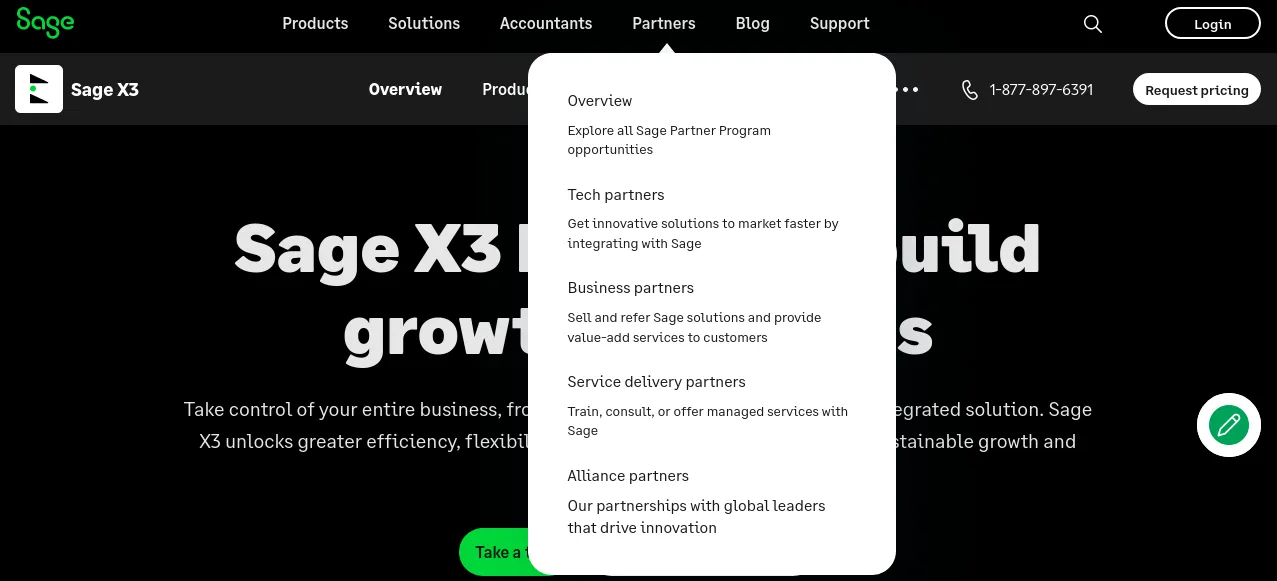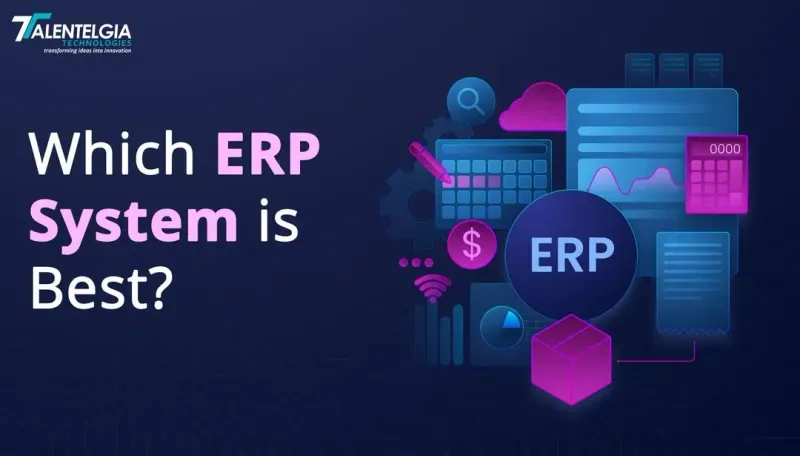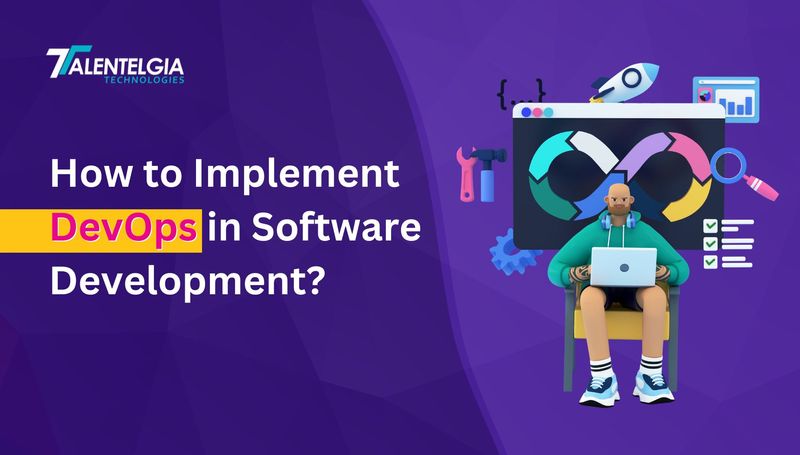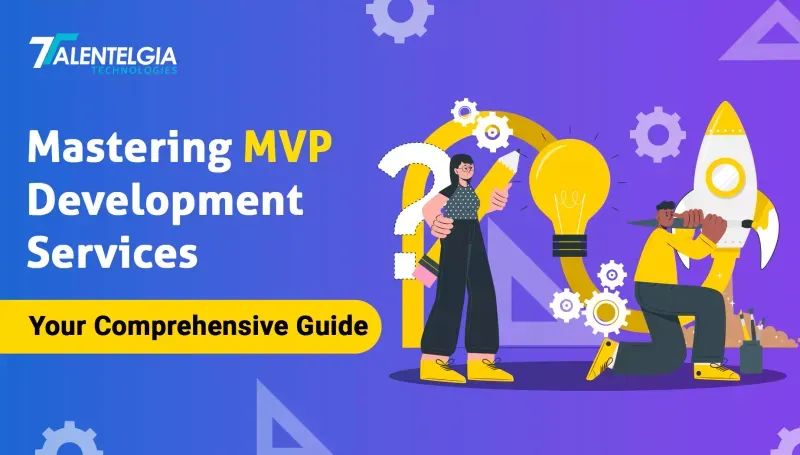Finding the perfect ERP development services for your organization is no walk in the park. With countless options, each claiming to revolutionize your operations, it’s easy to feel overwhelmed.
But don’t worry, we’re here to simplify the journey for you.
We will help you select the right system that streamlines the operations and becomes the key to the efficiency of your organization. So let’s have a look at the complexities and highlight features that define their strengths.
Which ERP system is best?
Dive into the world of ERP systems to find the perfect fit for your business that can level up your game. We get it – ERPs are eminent for business growth and can be hard to pick. But no worries – we’re here.
We will help you find the best. So, we have come up with a list of the top 10 ERP software considering factors like scalability that adapts to your growth plans, industry focus, tailored to your unique demands, and implementation costs.
But that’s not all – we’ve prioritized user-friendly interfaces and robust customer support, ensuring that your transition to the chosen ERP system is not just smooth but downright seamless.
Now roll up your sleeves and check out our top 10 ERP systems. Get ready to boost your business because the perfect ERP system for you is just a scroll away!
Microsoft Dynamics 365

Microsoft Dynamics 365 is an integrated ERP system that seamlessly connects various business functions, from finance to sales and customer service. It leverages the power of the Microsoft ecosystem, providing users with a familiar interface and facilitating collaboration across teams. Its cloud-based approach ensures accessibility and scalability for businesses of all sizes grabbing it a place on the best ERP software list.
Pros:
- Integrated Ecosystem: Seamlessly integrates with other Microsoft products like Office 365, enhancing collaboration and communication.
- Scalability: Scales well for businesses of various sizes, accommodating growth and evolving needs.
- User-Friendly Interface: Features an intuitive interface, reducing the learning curve for users.
- Comprehensive Functionality: Offers a wide range of modules, covering various business processes for end-to-end management.
Cons:
- Complex Implementation: Larger organizations may find the implementation process intricate and time-consuming.
- Cost: Initial costs and licensing fees can be relatively high, impacting the budget for smaller businesses.
- Customization Challenges: While robust, customization may require technical expertise, limiting ease of modification.
- Dependency on Internet Connectivity: As a cloud-based system, it heavily relies on consistent Internet connectivity.
Syspro

Navigating the complex landscape of business management, Syspro ERP emerges as a comprehensive solution, addressing the intricacies of diverse industries. From manufacturing to distribution, it aims to streamline operations, enhance efficiency, and foster growth.
Pros:
- Industry Focus: Syspro excels in catering to manufacturing and distribution industries, offering tailored features for their specific needs.
- Global Reach: With robust multi-currency and multi-language support, Syspro is well-suited for businesses with international operations.
- Customization: Syspro provides a high degree of customization, allowing businesses to adapt the system to their unique processes.
- Real-time Data Visibility: The system offers real-time insights into operations, empowering informed decision-making.
- Scalability: Syspro is designed to grow with businesses, accommodating expansion and evolving requirements effectively.
Cons:
- User Interface: Some users may find the user interface less modern compared to competitors, impacting overall user experience.
- Learning Curve: Implementation and training might pose challenges for users unfamiliar with ERP systems.
- Limited Modules: Syspro may lack some modules found in broader ERP solutions, potentially requiring third-party integrations.
- Scalability Concerns: As businesses grow, some users may encounter scalability limitations, unlike the best ERP software options.
- Integration Complexity: Integrating Syspro with third-party applications may be more complex compared to some other ERP systems.
Oracle ERP Cloud

Oracle ERP Cloud is the best ERP Software for end-to-end business management. With robust analytics and automation capabilities, Oracle ERP Cloud empowers businesses to drive efficiency and innovation. It is a scalable and flexible platform, that optimizes financial processes, supply chain operations, and human resources management for the organizations.
Pros:
- Comprehensive Suite: It offers a comprehensive suite covering financials, HR, supply chain, and more.
- Scalability: Scales effectively for both small businesses and large enterprises.
- Integration Capabilities: Easily integrates with other Oracle products and third-party applications.
- Global Capabilities: Provides strong support for international businesses with multi-language and multi-currency features.
Cons:
- Complex Implementation: Implementing certain modules may be complex and time-consuming.
- Cost: Initial costs and ongoing maintenance expenses can be high.
- Customization Challenges: Customization might require technical expertise, potentially limiting flexibility.
- User Interface: Some users find the user interface less intuitive compared to other modern ERP systems.
NetSuite ERP

NetSuite ERP is one of the best ERP software when it comes to cloud solutions. It is known for its versatility and scalability. It integrates core business functions like financial management, inventory, and order management into a unified platform. NetSuite’s user-friendly interface and customization options make it a popular choice for businesses seeking agility and real-time visibility into their operations.
Pros:
- Comprehensive Cloud Solution: NetSuite ERP is a fully integrated cloud-based solution, covering financials, CRM, and e-commerce, providing accessibility and scalability.
- Scalability: Suited for businesses of all sizes, NetSuite offers flexibility for growth and expansion, making it adaptable to evolving business needs.
- Real-time Visibility: The system provides real-time insights into business operations, enhancing decision-making and fostering agility in response to market dynamics.
- Global Reach: NetSuite supports multi-currency and multi-language functionalities, making it an ideal choice for international businesses with diverse operations.
- Automation and Efficiency: NetSuite offers automation features that streamline processes, reduce manual efforts, and improve overall operational efficiency.
Cons:
- Cost: Initial costs may be relatively high, impacting the budget for smaller businesses, and ongoing subscription fees can contribute to overall expenses.
- Complex Customization: Extensive customization might require technical expertise, making it potentially challenging for users with limited technical knowledge.
- Dependency on Internet Connectivity: As a cloud-based system, consistent and reliable Internet access is essential for optimal performance.
- Learning Curve: Users unfamiliar with ERP systems may experience a learning curve during implementation and adoption.
- Potential for Overcomplexity: The extensive range of features in NetSuite may lead to overcomplexity for smaller businesses with simpler needs, making it important to tailor the implementation to specific requirements.
Infor CloudSuite

Infor CloudSuite is designed to meet the specific needs of various industries. It provides comprehensive solutions for finance, human resources, and supply chain management. With a focus on industry-specific features and flexibility, Infor CloudSuite aims to enhance operational efficiency and drive business growth for organizations across different sectors.
Pros:
- Industry-Specific Solutions: Offers industry-specific solutions catering to various sectors, ensuring a tailored fit.
- User Interface: Its user-friendly interface, enhances user experience.
- Flexibility: Provides flexibility to choose working models like cloud, on-premise, and hybrid.
- Real-time Analytics: It emphasizes real-time analytics with its actionable insights.
Cons:
- Implementation Time: Implementation timelines can vary, and some users may experience longer deployment periods than the best ERP software.
- Cost: Pricing may be perceived as higher compared to some competitors.
- Dependency on Third-party Integrations: Some of its features require third-party integrations for functionality.
- Customization Limitations: Customization options are not as extensive as other ERP systems.
Epicor ERP

Epicor ERP is a versatile business management solution catering to industries like manufacturing, distribution, and retail. Known for its user-friendly interface, Epicor offers tools for inventory management, financials, and supply chain optimization. It empowers businesses to streamline operations and adapt to market changes efficiently.
Pros:
- Industry Focus: Tailored for industries like manufacturing, retail, and distribution, providing specialized features.
- Scalability: Adaptable for businesses of varying sizes, accommodating growth and changing requirements.
- Usability: User-friendly interface and intuitive navigation contribute to a positive user experience.
- Innovative Technologies: Incorporates emerging technologies, such as IoT and AI, for enhanced functionality.
Cons:
- Complex Customization: Customization may require technical expertise, potentially posing challenges for non-technical users.
- Cost: Initial costs and ongoing expenses might be perceived as higher compared to some competitors.
- Dependency on Internet Connectivity: As a cloud-based system, consistent internet connectivity is essential.
- Learning Curve: Implementation and training may require time, affecting the speed of adoption.
Sage X3

Sage X3 is an ERP solution designed for medium to large enterprises. With a focus on simplicity and scalability, Sage X3 integrates finance, manufacturing, and distribution processes. It is the best ERP Software to enhance operational efficiency and provide organizations with the flexibility to adapt to evolving business needs.
Pros:
- Flexibility: A flexible and scalable solution adaptable for various industries and business sizes.
- User-Friendly Interface: Features an intuitive interface, reducing the learning curve for users.
- Global Operations: Supports multi-company and multi-legislation functionalities, ideal for international businesses.
- Comprehensive Functionality: Covers finance, manufacturing, distribution, and other key business processes.
Cons:
- Implementation Time: Implementation timelines may vary, and some users may experience longer deployment periods.
- Customization Challenges: Extensive customization might require technical expertise.
- Dependency: Some features are dependent on third-party Integrations for comprehensive functionality.
- Cost: The pricing structure may be perceived as higher compared to some of the best ERP software.
Plex Systems

Plex Systems is a cloud-based ERP solution tailored for manufacturing industries. It offers features for production management, quality control, and supply chain optimization. Plex Systems stands out for its ability to provide real-time insights into manufacturing processes, promoting efficiency and data-driven decision-making.
Pros:
- Industry Focus: Specialized in manufacturing industries, offering features for production management and quality control.
- Real-time Data Visibility: Provides real-time insights into manufacturing processes, enhancing operational efficiency.
- Cloud-based Solution: As the best ERP software with a cloud-based system, it offers accessibility and scalability.
- Usability: User-friendly interface, contributing to a positive user experience.
Cons:
- Limited Modules: Lacks some modules found in broader ERP solutions, potentially requiring third-party integrations.
- Learning Curve: Implementation and training might pose challenges for users unfamiliar with ERP systems.
- Scalability Concerns: Some users may find scalability limitations as businesses grow.
- Interface Modernization: The user interface may be considered less modern compared to the other best ERP software.
SAP ERP (Enterprise Resource Planning)

SAP ERP is a powerhouse software designed to simplify and connect different parts of a business. Being the best ERP software, it covers everything from handling money (finance) to managing how things are made (supply chain and manufacturing) and even taking care of the people who work there (human resources).
Accely’s SAP S/4 HANA ERP system empowers organizations with real-time insights, streamlined reporting, and data-driven decision-making capabilities.
Pros:
- Easy Integration: SAP ERP smoothly brings together different tasks, making sure information flows well across the whole business.
- Fits Any Size: Whether a small business or a big one, SAP ERP is like a flexible tool that grows along with the company, adapting to its changing needs.
- Global Support: For businesses reaching across borders, SAP ERP is the best ERP Software as it understands various currencies, providing a standard way of doing things.
- Smart Insights: With SAP ERP, businesses get clever tools for understanding how well they’re doing, helping them make smart decisions in real time.
Cons:
- Cost Challenge: Getting started with SAP ERP can be pricey, with costs for licenses, adjustments, and training, making it a bit tough for smaller businesses.
- Customization Complexity: If a business wants to change a lot of things, it might need special know-how, which can make things a bit complicated and take more time.
- Learning Hurdle: For people new to this kind of system, it might take a little while to get the hang of it, affecting how quickly they can use it effectively.
- Need for Experts: Keeping SAP ERP running smoothly might need people who know it really well, potentially relying on outside experts for help.
Acumatica ERP

Acumatica is a cloud-based solution that is the best ERP software designed for small to mid-sized businesses. Offering modules for financial management, CRM, and project accounting, Acumatica prioritizes flexibility and customization. It empowers organizations to adapt to changing business requirements while ensuring a user-friendly experience.
Pros:
- Cloud-based Flexibility: A cloud-based ERP solution providing flexibility and accessibility.
- Scalability: Suited for small to mid-sized businesses, accommodating growth and expansion.
- Usability: User-friendly interface, making it accessible for users across various proficiency levels.
- Comprehensive Functionality: Covers financial management, CRM, and project accounting.
Cons:
- Dependency on Internet Connectivity: Consistent Internet access is essential for optimal performance.
- Cost: While competitive, costs may vary based on the selected modules and user count.
- Complex Customization: Extensive customization might require technical expertise.
- Industry-Specific Features: May not have as many industry-specific features as some of the best ERP Software.
.webp)
Conclusion
As we wrap up we tried to come up with the best options to help you find the perfect ERP development services. We aim to empower you with the knowledge needed to make an informed decision for your unique requirements.
Your individual needs, industry nuances, and future aspirations all play an important role in finding the perfect match. We’ve done our best to provide a roadmap, and now it’s your turn to navigate. May your choice be seamless, your implementation smooth, and your business thrives with the power of the right ERP solution. Here’s to finding the perfect fit for your journey!
FAQS
What factors should I consider when choosing an ERP?
When selecting an ERP, consider scalability, ensuring the system can grow. Evaluate user-friendly interfaces, as an intuitive design can enhance your workflow. Additionally, prioritize compatibility, ensuring the ERP aligns seamlessly with content creation and management.
What features are essential for an ERP?
Look for features like robust content management, real-time analytics, and customizable user permissions. These elements empower businesses to efficiently organize content, gain valuable insights, and collaborate effectively. Integration capabilities are also vital, allowing seamless connectivity with other tools.
How important is mobile accessibility in an ERP?
Mobile accessibility is crucial in today’s on-the-go world. Opt for an ERP with responsive design, enabling you to manage your businesses anytime, anywhere. This ensures flexibility and convenience, allowing you to stay connected and maintain control over operations from your mobile device.
Is it better to choose a cloud-based or on-premise ERP?
The decision between cloud-based and on-premise ERP depends on your preferences and needs. Cloud-based solutions offer flexibility and accessibility, ideal for remote management. On-premise options provide more control over data but may require a higher initial investment. Consider your specific requirements and your comfort with data management to make the right choice.


 Healthcare App Development Services
Healthcare App Development Services
 Real Estate Web Development Services
Real Estate Web Development Services
 E-Commerce App Development Services
E-Commerce App Development Services E-Commerce Web Development Services
E-Commerce Web Development Services Blockchain E-commerce Development Company
Blockchain E-commerce Development Company
 Fintech App Development Services
Fintech App Development Services Fintech Web Development
Fintech Web Development Blockchain Fintech Development Company
Blockchain Fintech Development Company
 E-Learning App Development Services
E-Learning App Development Services
 Restaurant App Development Company
Restaurant App Development Company
 Mobile Game Development Company
Mobile Game Development Company
 Travel App Development Company
Travel App Development Company
 Automotive Web Design
Automotive Web Design
 AI Traffic Management System
AI Traffic Management System
 AI Inventory Management Software
AI Inventory Management Software
 AI Software Development
AI Software Development  AI Development Company
AI Development Company  AI App Development Services
AI App Development Services  ChatGPT integration services
ChatGPT integration services  AI Integration Services
AI Integration Services  Generative AI Development Services
Generative AI Development Services  Natural Language Processing Company
Natural Language Processing Company Machine Learning Development
Machine Learning Development  Machine learning consulting services
Machine learning consulting services  Blockchain Development
Blockchain Development  Blockchain Software Development
Blockchain Software Development  Smart Contract Development Company
Smart Contract Development Company  NFT Marketplace Development Services
NFT Marketplace Development Services  Asset Tokenization Company
Asset Tokenization Company DeFi Wallet Development Company
DeFi Wallet Development Company Mobile App Development
Mobile App Development  IOS App Development
IOS App Development  Android App Development
Android App Development  Cross-Platform App Development
Cross-Platform App Development  Augmented Reality (AR) App Development
Augmented Reality (AR) App Development  Virtual Reality (VR) App Development
Virtual Reality (VR) App Development  Web App Development
Web App Development  SaaS App Development
SaaS App Development Flutter
Flutter  React Native
React Native  Swift (IOS)
Swift (IOS)  Kotlin (Android)
Kotlin (Android)  Mean Stack Development
Mean Stack Development  AngularJS Development
AngularJS Development  MongoDB Development
MongoDB Development  Nodejs Development
Nodejs Development  Database Development
Database Development Ruby on Rails Development
Ruby on Rails Development Expressjs Development
Expressjs Development  Full Stack Development
Full Stack Development  Web Development Services
Web Development Services  Laravel Development
Laravel Development  LAMP Development
LAMP Development  Custom PHP Development
Custom PHP Development  .Net Development
.Net Development  User Experience Design Services
User Experience Design Services  User Interface Design Services
User Interface Design Services  Automated Testing
Automated Testing  Manual Testing
Manual Testing  Digital Marketing Services
Digital Marketing Services 
 Ride-Sharing And Taxi Services
Ride-Sharing And Taxi Services Food Delivery Services
Food Delivery Services Grocery Delivery Services
Grocery Delivery Services Transportation And Logistics
Transportation And Logistics Car Wash App
Car Wash App Home Services App
Home Services App ERP Development Services
ERP Development Services CMS Development Services
CMS Development Services LMS Development
LMS Development CRM Development
CRM Development DevOps Development Services
DevOps Development Services AI Business Solutions
AI Business Solutions AI Cloud Solutions
AI Cloud Solutions AI Chatbot Development
AI Chatbot Development API Development
API Development Blockchain Product Development
Blockchain Product Development Cryptocurrency Wallet Development
Cryptocurrency Wallet Development About Talentelgia
About Talentelgia  Our Team
Our Team  Our Culture
Our Culture 
 Healthcare App Development Services
Healthcare App Development Services Real Estate Web Development Services
Real Estate Web Development Services E-Commerce App Development Services
E-Commerce App Development Services E-Commerce Web Development Services
E-Commerce Web Development Services Blockchain E-commerce
Development Company
Blockchain E-commerce
Development Company Fintech App Development Services
Fintech App Development Services Finance Web Development
Finance Web Development Blockchain Fintech
Development Company
Blockchain Fintech
Development Company E-Learning App Development Services
E-Learning App Development Services Restaurant App Development Company
Restaurant App Development Company Mobile Game Development Company
Mobile Game Development Company Travel App Development Company
Travel App Development Company Automotive Web Design
Automotive Web Design AI Traffic Management System
AI Traffic Management System AI Inventory Management Software
AI Inventory Management Software AI Software Development
AI Software Development AI Development Company
AI Development Company ChatGPT integration services
ChatGPT integration services AI Integration Services
AI Integration Services Machine Learning Development
Machine Learning Development Machine learning consulting services
Machine learning consulting services Blockchain Development
Blockchain Development Blockchain Software Development
Blockchain Software Development Smart contract development company
Smart contract development company NFT marketplace development services
NFT marketplace development services IOS App Development
IOS App Development Android App Development
Android App Development Cross-Platform App Development
Cross-Platform App Development Augmented Reality (AR) App
Development
Augmented Reality (AR) App
Development Virtual Reality (VR) App Development
Virtual Reality (VR) App Development Web App Development
Web App Development Flutter
Flutter React
Native
React
Native Swift
(IOS)
Swift
(IOS) Kotlin (Android)
Kotlin (Android) MEAN Stack Development
MEAN Stack Development AngularJS Development
AngularJS Development MongoDB Development
MongoDB Development Nodejs Development
Nodejs Development Database development services
Database development services Ruby on Rails Development services
Ruby on Rails Development services Expressjs Development
Expressjs Development Full Stack Development
Full Stack Development Web Development Services
Web Development Services Laravel Development
Laravel Development LAMP
Development
LAMP
Development Custom PHP Development
Custom PHP Development User Experience Design Services
User Experience Design Services User Interface Design Services
User Interface Design Services Automated Testing
Automated Testing Manual
Testing
Manual
Testing About Talentelgia
About Talentelgia Our Team
Our Team Our Culture
Our Culture

















 Write us on:
Write us on:  Business queries:
Business queries:  HR:
HR: 




